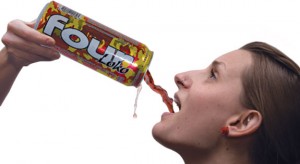When freshman Sarah* cracked the can open, she never thought the next few hours would end with her in the hospital, unable to remember what happened the night before.

“I woke up in the hospital, all alone, still drunk and unable to remember what had happened the night before,” Sarah said. “My phone was gone, my wallet and keys were gone, and all I knew was that I had alcohol poisoning.”
Sarah was drinking Four Loko the night she ended up in the hospital with a blood alcohol content of 0.26 percent. When she woke up in the hospital the next morning, still drunk, she had a fuzzy memory of the night before. The only memory she has from the ordeal is having her stomach pumped.
Sarah isn’t the only one to exceed her limit. Four Loko, a popular fruit-flavored malt drink that combines caffeine and alcohol in one can, will soon disappear from the shelves in New York state in response to health concerns.
Alcohol and caffeine are not a new combination, but the use of the two in one can is coming under harsh scrutiny from politicians, students and health officials. As of yesterday, these drinks have been banned in five states. Because of its popularity, high alcohol percentage, low price and overall look, Four Loko has been the target of state and federal attacks.
The New York State Liquor Authority pressured beer distributors Sunday to stop delivering the drinks to New York state retailers. This announcement came after a sting operation at 28 stores in the Bronx led to four arrests for selling the beverage to minors.
Phusion Projects, LLC, the maker of Four Loko, announced Sunday they would stop shipments to New York out of courtesy to the state. On Tuesday, Phusion Projects announced that it would remove the caffeine, guarana and taurine from all of its products to address the public’s concerns. According to a statement the company released Tuesday, it maintains its product is safe.
“We have repeatedly contended — and still believe, as do many people throughout the country — that the combination of alcohol and caffeine is safe,” they said.
Phusion Projects introduced Four Loko, its main product, in 2005. Named for the drink’s four main ingredients — caffeine, taurine, guarana and alcohol — it packs 12 percent alcohol and the same amount of caffeine as a cup of coffee into a 23.5 ounce can. As it grows in popularity, the safety of similar drinks has become a growing concern.
Before the combination was mass-marketed, consumers drank liquor with Red Bull and other energy drinks. The difference is that the alcohol percentage often seen in canned caffeinated alcoholic beverages is higher than some drinkers expect.
Jessica,* a 19-year-old sophomore, started drinking Four Loko this summer and finds the drink appealing because a friend told her it was cheap and could get her drunk quickly.
“It is easily transportable and is enough to drink for the night,” she said. “Sometimes it’s just a Four Loko night.”
While Jessica said she does not find the drinks harmful in moderation, she said that, as with any drink, too much is a bad thing.
Nancy Reynolds, program director of the Center for Health Promotion, works with students cited for alcohol on campus. She said the caffeine in these drinks hides the effects of the alcohol.
“It’s really a risky drink,” Reynolds said. “Students do not realize that there is at least five drinks in every can.”
Mike Brainard, owner of Rogan’s Corner, said he isn’t surprised products such as Four Loko are starting to be banned.
Rogan’s stocks six of the eight Four Loko flavors. Brainard said he has noticed a shift in what students are drinking based on the fluctuating price of beer.
“We get two shipments a week from our beer distributor and probably go through five cases of each flavor of Four Loko a week,” Brainard said. “It’s definitely our most popular drink.”
Now that these drinks have been outlawed, Brainard said he will no longer receive shipments of caffeinated alcoholic drinks from his distributor.
Phusion Projects will stop sending shipments to New York tomorrow and Dec. 10 is the last day distributors can deliver the product to retailers.
Jessica said she thinks more research needs to be done to examine the dangers of drinks like Four Loko.
“I don’t know how they are banning something without even doing the research on it,” she said. “Alcohol in itself is dangerous. Taking out Four Loko isn’t going to do anything.”
Brainard said he thinks the company will rethink their product and develop similar alternatives.
“Something else will come out, and it will become popular too,” he said. “The amount of alcohol in these drinks is just surprising. There was a time that the state of New York would never have allowed this product to sell, but I guess they always find a way.”







